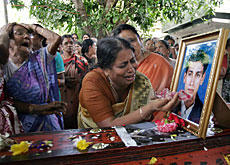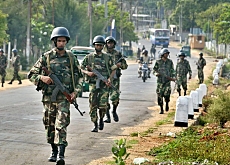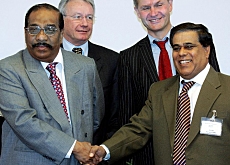NGOs wary after Sri Lanka slayings

Swiss aid agencies in Sri Lanka have expressed concern following the shooting of 17 workers of a French relief organisation at the weekend.
Some projects have been disrupted or postponed in the worst affected areas of the country, but NGOs have vowed not to withdraw despite a steady escalation in violence between government troops and Tamil rebels.
The murder of 17 Action Against Hunger workers is the first time NGO staff have been targeted in the growing conflict and has provoked widespread condemnation.
On Sunday, 15 of the victims were found shot at close range in the Sri Lankan town of Mutur and two others were discovered on Tuesday. Mutur is close to a flashpoint area in the northeastern district of Trincomalee that has seen recent fighting to gain control of a reservoir.
“Our staff are quite afraid at the moment because there has never been a violent incident like this against NGOs,” Terre des Hommes Switzerland spokeswoman Anja Bouerdick told swissinfo.
“In some areas we have had to stop our activities and re-evaluate because it is too dangerous – we put the security of our staff first.
“But we will not simply go away because we know the situation can change quite rapidly. We prefer to hibernate in these areas and wait for the situation to calm down.”
Lausanne-based Terre des Hommes Switzerland has some 200 workers, including 12 expatriate staff, and a further 100 volunteers in the Ampara and Batticaloa provinces of Sri Lanka.
A mother-and-child health programme has been forced to stop temporarily, while work at a social centre for children has been disrupted.
Security
Zurich-based NGO Swiss Labour Assistance has hired a security officer to safeguard its 70 staff in the country, but conducts its operations away from the trouble spots.
“If we see military aircraft in the skies then we call our people back from the field. This has only happened once in the past ten days,” said spokeswoman Ruth Dällenbach.
“Our security officer has had morning briefings with UN and Red Cross officials since the tensions began. But the latest violence has not had a direct impact on our work in this region.”
Violence has been escalating since April of this year despite both sides declaring their respect for a 2002 peace deal during February talks in Geneva.
Swiss government
The Swiss Agency for Development and Cooperation (SDC) – a government organisation – has been active in Sri Lanka for many years trying to promote peace. Activities were stepped up following the devastating tsunami in December 2004.
SDC spokesman Jean-Philippe Jutzi told swissinfo that the latest bloodshed would have no immediate material effect on the way its staff conduct their work.
“We had very strict security regulations in place even before these murders and they will stay in place,” he said.
“All transport and placement of staff has been kept to a strict minimum in Trincomalee for weeks. But, of course such a crime has consequences because we now have to be even more careful.”
swissinfo, Matthew Allen
The conflict between the Sri Lankan authorities and Tamil separatists has been ongoing since the mid-1970s.
In February 2002, both sides signed a permanent ceasefire agreement under a power-sharing deal – but it has showed few signs so far of stopping the violence.
Fighting abated when more than 30,000 people were killed in a tsunami in December 2004. However, troubles returned when Sri Lankan foreign minister Lakshman Kadirgamar was assassinated eight months later.
The latest flashpoint in the Trincomalee district – a Tamil stronghold in the northeast – started after rebels cut off water supplies from a reservoir last week.
The conflict in Sri Lanka has cost an estimated 62,000 lives, with some 800,000 people displaced in the past 20 years.
Switzerland donated SFr10.5 million ($8.6 million) of emergency aid to Sri Lanka following the tsunami – raising the total aid payments to the country to SFr16.95 million in 2005.
More than 35,000 Sri Lankans, mostly Tamils, live in Switzerland, of which ten per cent are naturalised Swiss. The ex-pat community is now one of the largest after those in Canada, Germany and Britain.

In compliance with the JTI standards
More: SWI swissinfo.ch certified by the Journalism Trust Initiative




You can find an overview of ongoing debates with our journalists here. Please join us!
If you want to start a conversation about a topic raised in this article or want to report factual errors, email us at english@swissinfo.ch.